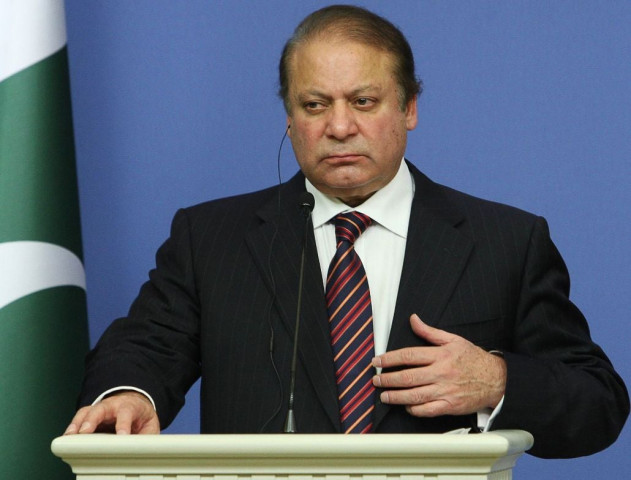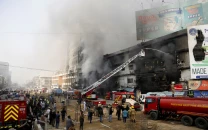Pakistan Protection Ordinance 2013: Nawaz seeks consensual vote for anti-terror law
PM opens letter campaign, solicits wide political backing.

Prime Minister Nawaz Sharif. PHOTO: AFP
Prime Minister Nawaz Sharif wants all political parties to vote in favour of the Pakistan Protection Ordinance 2013 when it is tabled in parliament for approval, The Express Tribune has learnt.
To garner support for the legislation, the prime minister wrote a letter to all parties on Saturday justifying its significance and stressing the need for the legislation.
The federal government, as part of its anti-terror measures, drafted the Pakistan Protection Ordinance (PPO) 2013 that declares “peace-disrupting” elements as “enemies of the state”, which President Mamnoon Hussain approved on October 19.
Now the prime minister wants the ordinance enacted as law, taking measures to channel politicking in favour of the legislation.
“The federal government considered it imperative to put in place a legal mechanism for intervention to protect the right and liberty of the common man, as well as the sovereignty and integrity of the state of Pakistan,” the premier wrote in his letter to the parties.
Enclosing a copy of the PPO with the letter, he said it is being promulgated with a view to give a strong message to organised crime and anti-state elements regarding “the will and determination of the state.”
The law is in full consonance with the country’s constitution and the current volatile security situation and the potential unfolding events in post-2014 Afghanistan warranted such a law, he explained.
Soon after the president’s approval, many questioned the ordinance and criticised the government of resorting to ordinances instead of introducing full-fledged laws. To this, the prime minister responded in the letter by linking the ordinance to his government’s efforts to eliminate the twin evils of terrorism and crime from society.
Trying to convince parliamentarians, he said the organised mafia is roaming free in the country “due to the legal vacuum created by the constant tampering of legislations over an extended period of time.”
Consequently, he said, the socio-economic fabric of our society is threatening to come apart. Prime Minister Nawaz voiced hope that all the political parties would support the legislation with the same spirit they exhibited during the all parties conference (APC).

An ordinance normally has a shelf life of 90 days before it has to be ratified by parliament. While the ordinance is likely to sail through the National Assembly where PML-N holds a majority of seats. However, it would face a challenge in the upper house from PPP and its allied parties who are in the majority.
The PPP has already made its intentions clear. Senator Raza Rabbani has said that the ordinance in its present form was unacceptable as it was against people’s fundamental rights. Speaking to journalists, the PPP senator said his party would oppose it in parliament.
Taliban peace talks
Prime Minister Nawaz Sharif has also directed Interior Minister Chaudhry Nisar Ali Khan to take all parties into confidence about any headway in the peace process with the Taliban.
“Representatives of different political parties should feel a part of the process,” PM Sharif instructed Nisar who called on him on Saturday.
The premier’s directives came in reaction to a letter by Leader of the Opposition in National Assembly Khursheed Shah. He asked the government to share with all parties “any and all work done so far in regard to talks with the Taliban since the APC”.
Jamiat-e-Ulema Islam-Fazl (JUI-F), which proposed holding a jirga, has been carrying out groundwork and has established back-channel contacts with sources in the tribal areas. However, the government has yet to give it a go-ahead.
“Maulana Fazlur Rehman’s proposal is the best for talks with the Taliban but the federal government has to decide on how to go about it,” said Senator Haji Ghulam Ali from JUI-F.
Last month, the government insinuated that eminent religious scholars might be given the task to negotiate with the Taliban.
“We have not been contacted by the government as yet. We were waiting for the prime minister’s return from the US to formally ask us,” said Qari Hafiz Jalandhri, the secretary general of Wafaqul Madaris. He, however, clarified that the ceasefire appeal was not made from the platform of Wafaq but it was an individual act of religious scholars.
Published in The Express Tribune, October 27th, 2013.



















COMMENTS
Comments are moderated and generally will be posted if they are on-topic and not abusive.
For more information, please see our Comments FAQ